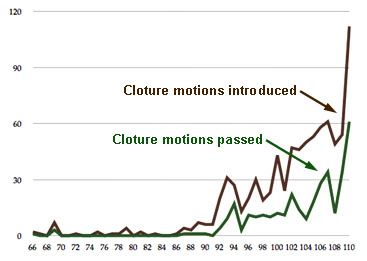James Fallows wants more public awareness about the modern-day corruption of the filibuster:
In a discussion with Guy Raz this afternoon on Weekend All Things Considered […] we touched on a point that I think needs to be elevated from a background/insider’s issue to absolutely first-tier consideration in mainstream political discourse. It has to do with the distorting and destructive effect of the Senate’s modern “60 votes to get anything done” system of operation.
As Fallows notes, this is a topic that’s well known among bloggers and political types, but almost completely unknown among the general public. They still think of filibusters as occasional  dramatic events from Mr. Smith Goes to Washington or the civil rights era, not as an institutionalized 60-vote supermajority required for all legislation.
dramatic events from Mr. Smith Goes to Washington or the civil rights era, not as an institutionalized 60-vote supermajority required for all legislation.
If you want to read more details about this, click the link. But I assume most of you already know the basic story. So instead, think about this: is it possible to elevate the filibuster into the public discourse? If so, how?
In one sense, it should be easy: most people don’t know about the 60-vote requirement and would instinctively be offended by the idea that you can no longer pass routine legislation with a simple majority. On the other hand, most people also don’t really care. Plus, one party or the other is always out of power at any given time, so there’s always a substantial minority of partisans who are motivated to argue that keeping the majority from running roughshod over everything we hold dear is a sacred principle of the Republic.
So what would it take to get people to care? One answer: a high-profile supporter. If Sarah Palin suddenly tweeted that the filibuster is a threat to democracy, for example, everyone would start talking about it. But who else is a plausible candidate for this? The president, of course, but he’s not going to. Anyone else?
Another answer: a popular, high-profile issue that gets blocked repeatedly by a 40-vote minority. Unfortunately, genuinely popular, high-profile issues generally don’t get filibustered. That’s why Supreme Court vacancies are filled pretty quickly but appellate court vacancies aren’t. So it’s not clear what issue would fit the bill here.
And a third answer: some kind of fabulously effective grass roots campaign. That seems pretty unlikely to me, though. Any other thoughts?

















